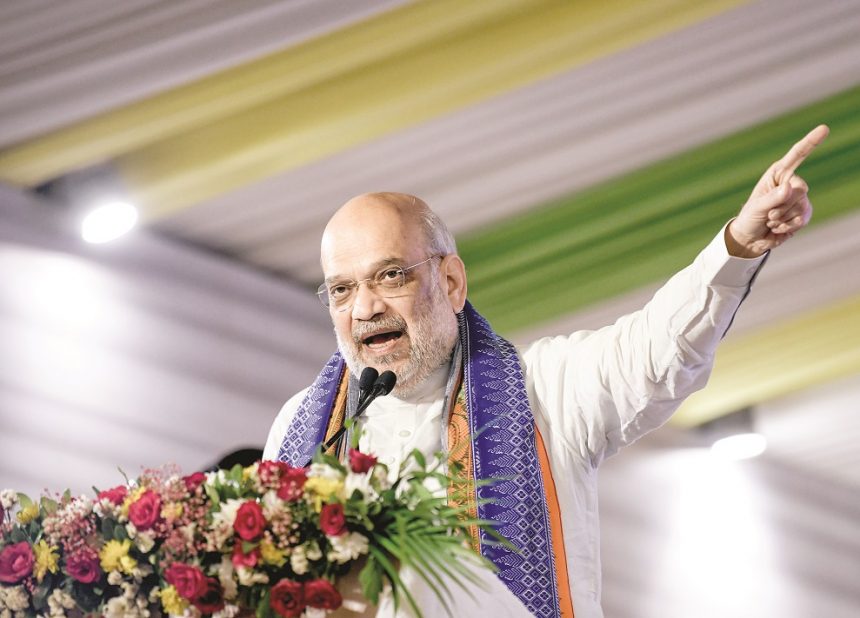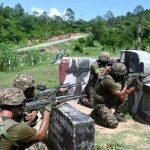Jammu, May 07: Amid escalating tensions between India and Pakistan following the launch of ‘Operation Sindoor’, in which nine terror camps were targeted in Pakistan and Pakistan Occupied Kashmir (PoK), Union Home Minister and Minister of Cooperation, Amit Shah, today chaired a security review meeting in New Delhi with the Chief Ministers and Lieutenant Governors of border states adjoining Pakistan and Nepal from various states .
The meeting, convened, both in person and via video conferencing, at the Ministry of Home Affairs, saw the participation of Lieutenant Governors of Jammu and Kashmir and Ladakh, as well as Chief Ministers from Jammu and Kashmir, Uttar Pradesh, Uttarakhand, Punjab, Rajasthan, Gujarat, and West Bengal, along with a representative from the Sikkim government. Senior officials from the Ministry of Home Affairs, Intelligence Bureau, Border Security Force (BSF), and Central Industrial Security Force (CISF) also joined the discussions.
Addressing the attendees, Shah underscored the significance of the military operation, stating that “Operation Sindoor” is a befitting reply from Bharat to those who dare to challenge India’s borders, military, and citizens. He credited Prime Minister Narendra Modi’s firm resolve for enabling the swift and decisive counteroffensive in retaliation to the deadly attack in Pahalgam on April 22.
“In line with the Prime Minister’s commitment, India has responded with strength and clarity,” Shah said, adding, “We did not ignore the Pahalgam attack—Operation Sindoor has sent a strong message to the world.”
In detailing the operation, Shah revealed that in the early hours of May 7, Indian armed forces successfully struck nine terrorist locations across PoK and Pakistan. He noted that “terrorist training camps, weapon bases, and hideouts belonging to Lashkar-e-Taiba, Jaish-e-Mohammed, Hizbul Mujahideen, and other groups were completely destroyed,” emphasising India’s zero-tolerance policy on terrorism.
Leaders present at the meeting praised the Indian Armed Forces for their effectiveness and congratulated the Prime Minister for the successful execution of Operation Sindoor, which Shah described as a major boost to the morale of citizens across the country.
While discussing the broader implications of the operation, the Home Minister emphasised the importance of national preparedness. He urged all states to conduct mock drills based on guidelines provided by the Ministry of Home Affairs and to ensure that essential services like hospitals, fire brigades, and supply chains remained uninterrupted. Shah also instructed states to keep SDRF, Civil Defence, Home Guards, and NCC units on alert, as well as calling for increased public participation through NGOs and community groups.
He further stressed the need for vigilance on digital platforms, urging that a “strict watch must be kept on anti-national propaganda through social and other media,” and called for swift and coordinated action between state and central agencies to curb the spread of misinformation.
Reinforcing the importance of public trust, Shah added, “States must avoid spreading unnecessary fear and instead work to raise awareness and counter rumours.” He concluded by emphasising the need for tighter coordination between local administrations, the armed forces, and paramilitary units to ensure national security and civil stability.
In addition to his meeting, Shah spoke with Jammu and Kashmir Chief Minister Omar Abdullah amidst rising tensions between India and Pakistan, following “Operation Sindoor”. The Union Home Minister also remained in close contact with Jammu and Kashmir Lieutenant Governor Manoj Sinha and the Director General of the Border Security Force (BSF). Shah instructed the DG BSF to implement safety measures for civilians living in border areas, ensuring that all necessary precautions were taken in response to the ongoing situation.
Earlier in the day, Wing Commander Vyomika Singh, who briefed the media alongside Foreign Secretary Vikram Misri and Colonel Sofiya Qureshi, explained that Operation Sindoor had been launched to deliver justice to the victims of the Pahalgam terror attack and their families. Singh revealed that a total of nine terror sites had been targeted and successfully destroyed during the operation, stressing that the locations had been carefully selected to avoid any collateral damage to civilian infrastructure.
“Operation Sindoor was launched by the Indian Armed Forces to deliver justice to the victims of the Pahalgam terror attack and their families. Nine terrorist camps were targeted and successfully destroyed… The locations were so selected to avoid damage to civilian infrastructures and loss of any civilian lives,” Wing Commander Singh confirmed.
Foreign Secretary Vikram Misri stated that the Pahalgam attack was part of a broader effort to undermine the return of normalcy in Jammu and Kashmir, asserting that the Indian Armed Forces’ strikes represented an important step in countering such efforts.








